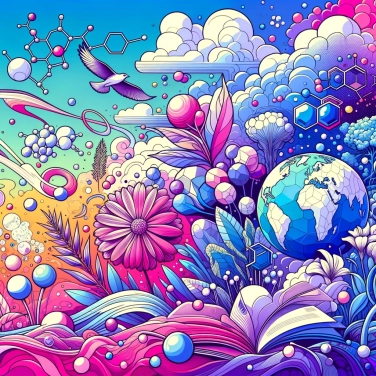Water is essential for life on Earth because it is a universal solvent, allowing for biochemical reactions, regulating the temperature of the body and ecosystems, and playing a key role in the transport of nutrients and waste.

Water makes up about 60 to 70% of the human body and is the very foundation of the cells of all living organisms. It directly plays a role in cellular function, for example, by transporting nutrients, eliminating metabolic waste, or enabling enzymes to work effectively in vital chemical reactions. Without water, cells cannot perform their basic tasks: producing energy, repairing structures, or allowing information to flow quickly. It is also essential for regulating body temperature: when you sweat, the water expelled cools your body and prevents overheating. In short, without water, no known form of life could simply exist.
Water has several amazing qualities that make life possible. First, its ability to act as a super solvent: many chemical substances essential to life mix easily in it, allowing cells to benefit from vital nutrients. Next, it has a high thermal regulation capacity: it heats up and cools down slowly, stabilizing the planet's climate and the temperature of living organisms. It also has a particular feature you probably know: ice floats. Unlike almost all other liquids, water becomes less dense when it freezes. This is significant, as lakes and rivers freeze on the surface, allowing life to continue peacefully below. Lastly, let's quickly mention the cohesion of its molecules: they stick together, enabling plants to efficiently transport water from their roots to their leaves. Without these unique features, life would be quite unlikely.
Water is clearly the vital fuel of every terrestrial ecosystem. It allows plants to ensure their development through photosynthesis, an essential process for producing the oxygen that sustains the entire planet. Thanks to water, nutrients circulate easily in the soils to nourish plants, and thus indirectly all those who eat them, such as herbivorous animals. Water bodies like lakes or rivers also serve as natural habitats essential for countless animal and plant species. In short, without water, the food chain, biodiversity, and the entire balance of nature would be completely disrupted.
Water is a true thermal sponge: it absorbs heat from the sun during the day and gently releases it at night, preventing extreme temperatures on our planet. Similarly, ocean currents, like the Gulf Stream, mix large amounts of water and distribute this accumulated heat across the planet. Through evaporation from the oceans and water surfaces, clouds form and also moderate global temperatures by reducing direct solar radiation. For their part, ice caps reflect a large portion of sunlight back into space, helping to keep certain land areas cool. Without these mechanisms, climatic conditions would be much harsher on Earth, with temperature contrasts that would be unbearable for all living things.
Freshwater is a limited resource and is not always well distributed around the planet. In the face of global population growth, pollution, and climate change, our water resources are beginning to come under significant pressure. Many places are already experiencing concerning shortages, and some ecosystems are at risk of completely disappearing due to lack of water. Adopting a sustainable management approach means consuming water while ensuring its availability and quality in the long term. For example, by using more efficient techniques for collecting rainwater, recycling wastewater, and raising awareness to avoid wasting this precious resource, we can continue to enjoy this natural wealth peacefully.
Did you know that almost all chemical reactions that occur in living beings require the presence of water to take place? Indeed, water provides the ideal environment to facilitate molecular exchanges and energy transfers that are essential for all forms of life.
Did you know that a person can survive for several weeks without food but only about three days without water? This fact illustrates the central importance of water in meeting the vital needs of organisms.
Did you know that sweating and the evaporation of water from plant leaves play a crucial role in maintaining a stable climate? Every year, plants around the world release billions of liters of water into the atmosphere, thus contributing to the global water cycle and the regulation of the Earth's climate.
Did you know that the Earth's oceans cover about 71% of our planet's surface, but only about 2.5% of all the water available on Earth is fresh water, and less than 1% is easily accessible for our daily consumption? This precious resource therefore needs to be protected and managed sustainably.
The discovery of water on another planet is of great importance because liquid water is considered an essential condition for the potential development of life forms. Thus, the presence of water indicates a possibility of habitability.
Water regulates the planetary climate through several processes such as evaporation, cloud formation, and precipitation. Oceans store heat and redistribute thermal energy across the planet, thereby contributing to the maintenance of a stable climate suitable for life on Earth.
The absence or lack of access to drinking water has serious health consequences, such as the spread of infectious diseases, particularly those of waterborne origin. It also affects the quality of life, restricts economic activities, and creates significant socio-economic challenges.
No, the majority of the water on Earth is salty (about 97.5%), and only 2.5% is freshwater. Of this 2.5%, a large portion is trapped in the polar ice and glaciers, making the amount of accessible freshwater very limited and precious.
On average, it is recommended that an adult consumes about 1.5 to 2 liters of water per day. However, these water needs can vary based on several factors, such as age, physical activity, climate, and overall health condition.

0% of respondents passed this quiz completely!
Question 1/5